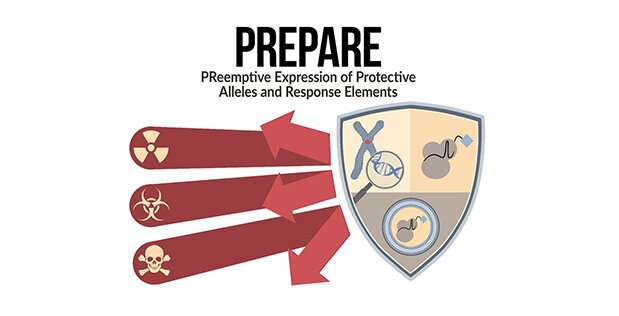Credit: DARPA
Breakthroughs in the science of programmable gene expression inspired DARPA to establish the PReemptive Expression of Protective Alleles and Response Elements (PREPARE) program with the goal of delivering powerful new defenses against public health and national security threats. DARPA has now selected five teams to develop a range of new medical interventions that temporarily and reversibly modulate the expression of protective genes to guard against acute threats from influenza and ionizing radiation, which could be encountered naturally, occupationally, or through a national security event.
The program builds from the understanding that the human body has innate defenses against many types of health threats, but that the body does not always activate these defenses quickly or robustly enough to block the worst damage. To augment existing physiological responses, PREPARE technologies would provide a programmable capability to up- or down-regulate gene expression on demand, providing timely, scalable defenses that are proportional to anticipated threats. Service members and first responders could administer these interventions prior to threat exposure or therapeutically after exposure to mitigate the risk of harm or death.
"Researchers working within the PREPARE program seek to improve rates of survival and recovery in catastrophic scenarios for which reliable and scalable countermeasures don't currently exist," said Dr. Renee Wegrzyn, the PREPARE program manager.
For example, influenza persists as a perennial health threat despite the development of vaccines that help protect against predicted strains of circulating virus. The annual challenge of developing a new vaccine and the burdensome logistics of storing, transporting, and distributing injectable vaccines make alternative protective strategies desirable.
Three PREPARE teams are pursuing multi-pronged approaches to influenza defense and treatment that use programmable gene modulators to boost the human body's natural defenses against influenza and also weaken the virus' ability to cause harm by directly neutralizing the viral genomes. If successful, their approaches would potentially protect against virtually all influenza strains—regardless of whether a virus is newly emergent or has developed drug resistance—and would provide near instantaneous immunity, in contrast to traditional vaccines. Additionally, the teams are designing their countermeasures so that they are simple to deliver—for example, as intranasal sprays—reducing the logistical challenge of protecting large numbers of people.
- A team led by DNARx LLC, under principal investigator Dr. Robert Debs, aims to develop a new DNA-encoded gene therapy that helps patients fight influenza by boosting the natural immune response and other protective functions of their nasal passages and lungs.
- A team led by the Georgia Institute of Technology, under principal investigator Dr. Phil Santangelo, aims to develop novel gene therapies to enable protection against a wide range of influenza strains by delivering mRNA-encoded programmable gene modulators and programmable antivirals to the lungs to boost host defenses and/or immediately halt viral replication. The team will also pursue strategies to improve the immune responsiveness and efficacy of current influenza vaccines.
- A team led by the University of Massachusetts Medical School, under principal investigator Robert Finberg, M.D., aims to identify novel host and viral target sequences, including long non-coding RNAs, which can be used to boost host resilience against influenza. The project will involve performing innovative CRISPR-based screens on cultured human cells, identifying critical host and viral factors using samples from human research subjects, and implementing a lung airway model.
Other PREPARE teams are pursuing treatments to protect the body from the effects of ionizing gamma radiation. In humans, radiation poisoning primarily affects stem cells in the blood and gut, yet existing treatments only help to regenerate blood cells, and only with limited effect. There is no possibility for prophylactic administration of these drugs, and most must be delivered immediately following radiation exposure to provide any benefit. There are no existing medical countermeasures for radiation damage to the gut.
The following two teams are working to generate programmable gene modulators that can protect the blood or gut, with the possibility of prophylactic administration of interventions to service members and first responders going into environments where the risk of radiation exposure is high.
- A team led by Columbia University Irving Medical Center, under principal investigator Dr. Harris Wang, aims to develop an orally delivered, programmable gene modulator therapeutic. The multimodal treatment the team envisions would take hold in both the gut and liver, triggering protection and regeneration of intestinal cells, while also inducing liver cells to produce protective cues that trigger the regeneration of blood cells in bone marrow.
- A team led by the University of California, San Francisco, under principal investigator Dr. Jonathan Weissman, also aims to develop gene therapies to enhance resilience against ionizing radiation. The team's approach should result in an intravenous or orally available treatment that activates innate defenses in gut and blood stem cells for a period of several weeks.
All of the teams are working toward an end goal of submitting at least one product to the U.S. Food and Drug Administration (FDA) for regulatory review as an Investigational New Drug by the end of the program period. DARPA requires teams to work closely with the FDA throughout the four-year program to ensure data generated and experimental protocols meet regulatory standards. The research will similarly benefit from insights garnered through regular engagement with bioethicists.
One such insight—that permanent edits to the genome are neither desirable nor ethically justifiable in otherwise healthy populations—informed DARPA's decision to mandate that PREPARE technologies have only temporary and reversible effects and do not alter host primary DNA sequences in any way. Teams will achieve this by interfacing only with the epigenome and transcriptome, the cellular messages that carry out DNA's genetic instructions inside cells.
"PREPARE reflects DARPA's 'safety first' approach to genome editing," Wegrzyn said. "We're developing tools that deliver the health and safety benefits of modulating genetic expression without the risks of permanent edits to the genome and the potential off-target effects they entail."
Provided by DARPA
























